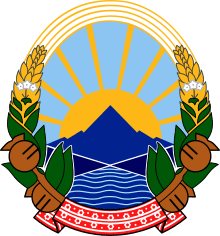Denes nad Makedonija
"Denes nad Makedonija" (Macedonian: Денес над Македонија, pronounced [ˈdɛnɛs nad makɛˈdɔnija]; lit. '"Today Over Macedonia"'; Albanian: Sot mbi Maqedoninë) is the national anthem of North Macedonia; both the music and lyrics date from the early 1940s. Todor Skalovski composed the music, while the lyrics were written by Vlado Maleski. It was adopted as the national anthem in 1992, a year after the state's independence was declared from Yugoslavia. Before its adoption as a national anthem, it was used as the regional anthem of the Socialist Republic of Macedonia, a constituent state of Yugoslavia.
| English: Today Over Macedonia | |
|---|---|
| Денес над Македонија Sot mbi Maqedoninë | |
National anthem of | |
| Lyrics | Vlado Maleski, 1943 |
| Music | Todor Skalovski, 1941 |
| Published | 1942 |
| Adopted | 14 April 1989 |
| Readopted | 11 August 1992 |
| Relinquished | 8 September 1991 (by the Socialist Republic of Macedonia) |
| Audio sample | |
"Denes nad Makedonija" (instrumental, one verse)
| |
History

The lyrics of "Denes nad Makedonija" were penned by Vlado Maleski, a writer who was active in the Partisan movement during World War II.[1] In particular, he took charge of Radio Skoplje in December 1944, penned the manuscript for the first Macedonian-language movie,[1] sat on the editorial board of the first Macedonian publishing house,[2] and was part of the Commission for Language and Orthography that submitted recommendations to the government on standardizing the Macedonian alphabet, which were subsequently accepted.[3] For his extensive contributions to the country's literature, Maleski is regarded as part of "the first generation of Macedonian prose writers".[4]
The musical portion was composed by Todor Skalovski, one of Macedonia's most distinguished composers who also served as the conductor of its opera.[5][6] He is also regarded as one of the trailblazers in composing music inspired by and incorporating Macedonian culture and mythology.[6][7] The song was first played in 1942, among groups affiliated with the communist and Partisan resistance in Struga[8] (which also happens to be Maleski's birthplace).[1] According to oral recounts, the hymn was played by Maleski himself on New Year's Eve in the presence of 24 youths, whose identities were subsequently documented in writing only in 1981. Even though the resistance consisted of fighters from the different ethnic groups across Yugoslavia, the aforementioned youths are believed to have all identified as Macedonians.[9] From the end of the war, it was utilized – albeit unofficially[9] – as the regional anthem of the Socialist Republic of Macedonia (which was part of Yugoslavia at the time)[10] until 1989.[9]
Meanwhile, during the Informbiro period, a small change was made in the lyrics. In the new version the names of Nikola Karev and Dimitar Vlahov were scrapped and that of Dame Gruev was added.[11] Karev's name was removed, as he and his brothers were suspected of being Bulgarophile elements.[12] Vlahov also was dismissed, because he came from the Bulgarian Communist Party, communicated much better in Bulgarian than in the newly codified Macedonian language, and had no political supporters in Macedonia.[13] The initial idea of then communist elite to remove also the name of Gotse Delchev and not to include that of Dame Gruev, because of their Bulgarophile sentiments, was finally abandoned.[14] On 14 April 1989 the socialist republic's Assembly amended the Constitution of 1974 to expressly affirm "Denes nad Makedonija" as its official regional anthem.[9] This change was short-lived, however, as the Assembly declared Macedonia's sovereignty two years later in January.[15] This was approved on 8 September 1991 in a referendum that saw Macedonians vote overwhelmingly in favour of independence.[16][17]
Soon after independence, the Macedonian national legislature held a contest to determine a national anthem for the newly-sovereign state.[9] "Denes nad Makedonija" was one of several candidates in contention[8] – the others in the running were "Himma" (English: "Anthem", lit. 'Hymn') by Taki Hrisik and "Dani bideš večna" (English: "That You Should be Eternal") by Aleksandar Džambazov[9] – and ended up finishing runner-up in the final results.[8] In spite of this, most of the Assembly Commission voted to make it the national anthem of the nascent state, and it was duly adopted on 11 August 1992.[8][9]
Context of lyrics
The lyrics of "Denes nad Makedonija" are reflective of a military marching song, which is fitting given its connection to the Yugoslav Macedonian theatre of the Second World War. They are not a call to arms for Macedonians; rather, the hymn uses imagery to take the person singing it back to the time the anthem was written, and purports that they themselves were engaging in combat at the time.[9] Furthermore, the lyrics previously alluded to the concepts of mothers and motherhood (specifically in the second stanza). This is in line with the national anthems – both past and present – of other Southeast European countries like Bosnia and Herzegovina ("Jedna si jedina"), Croatia ("Horvatska domovina"), and Montenegro ("Oj, svijetla majska zoro").[18] It discussed how mothers mourn for their fallen sons, who died fighting for the rights and liberty of their country. They are comforted for their loss by being reminded of the bravery of their sons and the nobleness of the cause for which they died. Although this theme has been described as a "standard anthemic device", it was subsequently expunged from the official words of the state anthem.[18]
Legal protection
Macedonia's Sobranie (legislative chamber) passed legislation titled "The Law on the Anthem of the Republic of Macedonia" on 11 August 1992. This officially adopted "Denes nad Makedonija" as the national anthem of the then-nascent country,[9] with Article 2 specifically confirming the song's status as such.[8] However, it did not stipulate which stanzas were to be recognized as official.[9] Curiously, the statute did not technically pass with the requisite two-thirds majority as stipulated by Article 5 of the country's constitution for proposals concerning national symbols (the anthem, the flag, and the national emblem).[9][19] Although 88 out of the 120 members of the assembly voted for it, representatives elected from the Albanian community were not involved.[8]
Lyrics
"Denes nad Makedonija" as originally written consists of four stanzas. North Macedonia's law does not exactly specify which stanzas are officially constitute the national anthem,[9] though the second stanza is often omitted from the lyrics of the national anthem that are posted on North Macedonia's government websites.[18][19]
Macedonian lyrics
Cyrillic script |
Latin script |
IPA transcription |
Прва строфа: |
Prva strofa: |
[ˈpr̩va ˈs̪t̪rɔfa] |
Albanian translation
Strofa e parë |
English translation
I |
References
- Bechev, Dimitar (April 13, 2009). Historical Dictionary of the Republic of Macedonia. Scarecrow Press. pp. 140–141. Retrieved June 24, 2017.
- Dimova, Rozita (2013). "The 'Nation of Poetry': Language, Festival and Subversion in Macedonia". History and Anthropology. 24 (1): 140. doi:10.1080/02757206.2012.759112. (registration required)
- Vidoeskit, Božidar (January 1998). "Five decades since the codification of the Macedonian language". International Journal of the Sociology of Language. 131 (1). doi:10.1515/ijsl.1998.131.13. (registration required)
- Rossos, Andrew (2008). Macedonia and the Macedonians: a history. Hoover Institution Press. p. 255. Retrieved June 24, 2017.
- Macedonia: Country Study Guide – Strategic Information and Developments. 1. Lulu Press Inc. March 3, 2012. p. 51. Retrieved June 22, 2017.
- Samson, Jim (May 23, 2013). Music in the Balkans. Brill Publishers. p. 490. Retrieved June 22, 2017.
- Randel, Don Michael, ed. (2003). The Harvard Dictionary of Music (4th ed.). Harvard University Press. p. 478. ISBN 9780674011632. Retrieved June 22, 2017.
- Kolstø, Pål (April 1, 2016). Strategies of Symbolic Nation-building in South Eastern Europe. Routledge. Retrieved June 15, 2017.
- Pavković, Aleksandar; Kelen, Christopher (October 28, 2015). "Chapter 6 – A Fight for Rights: Macedonia 1941". Anthems and the Making of Nation States: Identity and Nationalism in the Balkans. I.B. Tauris. Retrieved June 15, 2017.
- "Macedonia". The World Factbook. CIA. June 15, 2017. Retrieved June 23, 2017.
- Pål Kolstø, Strategies of Symbolic Nation-building in South Eastern Europe, Routledge, 2016, ISBN 1317049365, p. 188.
- Keith Brown, The Past in Question: Modern Macedonia and the Uncertainties of Nation, Princeton University Press, 2018 ISBN 0691188432, p. 191.
- Andrew Rossos, Macedonia and the Macedonians: A History; Hoover Institution Press Publication, Hoover Press, 2013, ISBN 081794883X, p. 238.
- Последното интервју на Мише Карев: Колишевски и Страхил Гигов сакале да ги прогласат Гоце, Даме и Никола за Бугари! Денешен весник, 01.07.2019.
- "Macedonia – History". Worldmark Encyclopedia of Nations (12th ed.). Thomson Gale. 2007. Retrieved June 23, 2017.
- Allcock, John B.; Danforth, Loring (December 6, 2016). "Macedonia – History". Encyclopedia Britannica. Encyclopedia Britannica, Inc. Retrieved June 23, 2017.
- "Republic of Macedonia – History". Gale Encyclopedia of World History: Governments (1st ed.). Thomson Gale. 2008. Retrieved June 23, 2017.
- Kelen, Christopher; Pavković, Aleksandar (2014). ""Zdravljica" – toast to a cosmopolitan nation anthem quality in the Slovenian context". Nationalities Papers: The Journal of Nationalism and Ethnicity. 42 (5): 839. doi:10.1080/00905992.2014.916664. (registration required)
- "State Symbols of Republic of Macedonia". Ministry of Foreign Affairs. Government of the Republic of Macedonia. Archived from the original on June 17, 2017. Retrieved June 17, 2017.
- "Државни симболи на Р. Македонија". Ministry of Foreign Affairs (in Macedonian). Government of the Republic of Macedonia. Archived from the original on June 17, 2017. Retrieved June 17, 2017.
External links
| Wikisource has original text related to this article: |
- Government of North Macedonia – North Macedonia's government website has a page about North Macedonia's national symbols such as the national anthem, including a vocal version (in Macedonian)
- MP3 sound file (instrumental)
